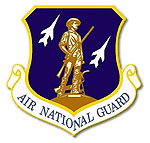Guard, Reserve leaders discuss budget issues
 WASHINGTON -- The military's reserve components remain ready and capable despite budget cuts and their transition from a strategic to operational force, senior National Guard and Reserve officials told the Senate Appropriations Committee's defense subcommittee here May 23.
WASHINGTON -- The military's reserve components remain ready and capable despite budget cuts and their transition from a strategic to operational force, senior National Guard and Reserve officials told the Senate Appropriations Committee's defense subcommittee here May 23.
As the drawdown continues in Afghanistan, the Guard and Reserve will maintain deployment-ready units undeterred by force structure changes such as the Air National Guard's end strength reduction by 5,100 billets and aircraft inventory reduction by 134 aircraft, Gen. Craig R. McKinley, the National Guard Bureau chief, told the senators.
For example, McKinley said, the Air National Guard's partnership with more than 60 foreign countries has strengthened the component's military capacity and competence.
Lt. Gen. Harry M. Wyatt III, the Air National Guard director, said 22 partner nations have provided 11,000 troops to Afghanistan, and 40 partner nations have provided more than 31,000 personnel in support of U.N. peacekeeping operations. Last year, Guard Airmen filled about 54,000 requests for manpower, he added, noting that 91 percent of those requests were fulfilled with volunteers.
Wyatt said the Air National Guard's budget request priorities were to align force size and composition to be flexible, agile and ready with a focus on new missions, such as the MC-12 Liberty and remotely piloted aircraft. He added that other high priorities included maintaining a combat-ready force able to quickly surge and integrate seamlessly in joint operations while rearranging units impacted by the base closure and realignment process and recent programming changes.
"I am highly confident that the authorized Marine Corps (Reserve) end strength of 39,600 is appropriate for providing us with the personnel required to support the total force during active component build-down," he said.
In the future, the Air Force Reserve may face personnel challenges, with a projected reduction of 900 personnel that Lt. Gen. Charles E. Stenner Jr., the Air Force Reserve chief, described as the "tip of the iceberg."
"Our Reserve is losing trained personnel and taking on new missions," he said. "The personnel losses are in specialties that are still essential to the total force and at the same time don't easily transfer to newly assigned mission areas."
Stenner noted that an aircraft maintainer with 17 years of experience cannot become a cyber warrior with 17 years of experience overnight. "With that perspective, the Air Force is actually losing the capability of 5,000 to 6,000 experienced and trained personnel, and that loss could seriously affect the strategic reserve posture," he told the senators.
McKinley told the senators the reserve components have evolved from being a strategic reserve to an operational force over the last decade of war, and that should be the way of the future.
"During a time of constrained budgets, we should continue to be used as an operational force to ensure the nation is getting the most defense capability at the lowest cost," McKinley said, adding that more than 50 percent of Guardsmen have combat experience.